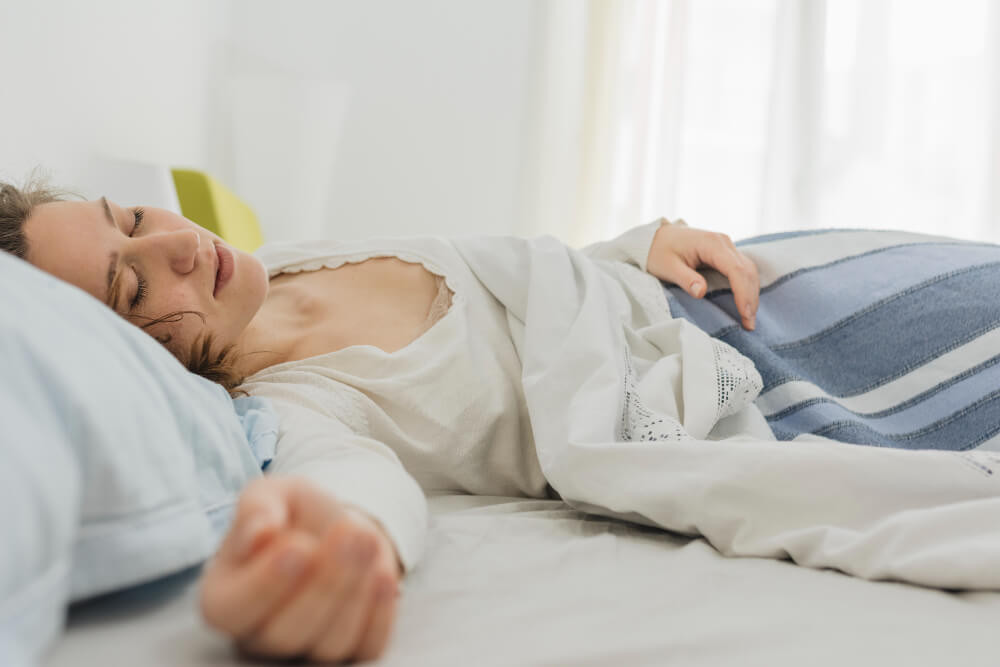Serangan jantung adalah kondisi dimana otot jantung tidak mendapat aliran darah sehingga jantung tidak dapat memompa darah seperti seharusnya. Kondisi ini dapat terjadi ketika Anda terjaga atau tertidur. Sebagian besar serangan jantung yang terjadi saat tidur dapat menyebabkan kematian.
Penyebab Serangan Jantung saat Tidur
Serangan jantung merupakan kondisi yang dapat terjadi kapan saja, baik ketika Anda terjaga atau tertidur lelap. Banyak orang menganggp henti jantung dan serangan jantung adalah kondisi yang sama, namun sebenarnya berbeda.
Henti jantung terjadi ketika otot jantung berhenti berdetak secara tiba-tiba yang dapat disebabkan karena gangguan irama jantung sedangkan serangan jantung terjadi karena adanya sumbatan pada pembuluh darah jantung.
Ketika serangan jantung terjadi saat tidur, tidak semua orang dapat terbangun setelah terjadinya serangan jantung. Sebagian besar orang yang mengalami serangan jantung saat tidur berakhir dengan meninggal dunia.
Sekitar 10% pasien jantung dapat mengalami serangan jantung saat tidur dan sering terjadi ketika saat pagi dimana terjadi lonjakan hormon katekolamin yang berperan dalam sirkulasi darah dan modulator sistem saraf pusat.
Baca Juga: Pengobatan Rumahan untuk Mengatasi Jantung Berdebar Kencang
Para ahli menduga terjadinya serangan jantung saat tidur disebabkan oleh sobeknya plak aterosklerosis yang sebelumnya sudah terbentuk pada arteri koroner yang diikuti dengan terbentuknya bekuan darah di pembuluh darah tersebut. Akibatnya aliran darah yang memasok nutrisi dan oksigen ke otot jantung berkurang. Kondisi ini biasanya ditandai dengan rasa nyeri pada dada yang dikenal sebagai gejala serangan jantung.
Namun ada kalanya serangan jantung terjadi tanpa gejala. Kondisi ini dikenal dengan silent heart attack. Bagi Anda yang memiliki riwayat masalah jantung sebaiknya waspada dengan kondisi ini karena kondisi ini berisiko memicu serangan jantung mendadak dan menyebabkan kematian.
Tanda dan Gejala Serangan Jantung
Selain saat tidur, serangan jantung juga dapat terjadi ketika Anda mengalami stres fisik dan emosional, Anda sangat aktif secara fisik (berolahraga intenstitas tinggi), atau saat berada di luar rumah ketika cuaca dingin.
Silent heart attack atau serangan jantung mendadak sering kali tidak disadari, namun kondisi ini perlu diwaspadai karena dapat memicu kerusakan jantung dan gagal jantung. Meski tidak menunjukkan gejala yang jelas, namun ada beberapa tanda silent heart attack yang perlu diwaspadai antara lain:
- Nyeri dada yang berlangsung lebih dari beberapa menit
- Sesak napas
- Tubuh bagian atas terasa tidak nyaman
- Sakit kepala ringan
- Keringat dingin
- Mual dan muntah
- Kelelahan yang bisa berlangsung selama beberapa hari tanpa penjelasan
Ketika mengalami serangan jantung mendadak, sering kali gejalanya dapat membuat Anda merasa seperti:
- Mengalami gejala mirip flu
- Mengalami nyeri otot di dada atau punggung atas
- Merasakan sakit di rahang, lengan, atau punggung atas
- Sangat lelah
- Mengalami gangguan pencernaan
Tanda lain yang dapat muncul adalah nyeri dada (angina) yang terasa ketika Anda bergerak. Rasa nyeri ini dapat berhenti selama beberapa saat setelah beristirahat. Jika rasa nyeri tidak kunjung hilang, sebaiknya segera periksakan diri ke dokter.
Baca Juga: Waspada, Ini 6 Komplikasi Penyakit Jantung yang dapat Berakibat Fatal
Bisakah Serangan Jantung Dicegah?
Serangan jantung dapat dicegah dengan menerapkan gaya hidup sehat seperti berolahraga, berhenti merokok, makan makanan sehat, mengelola stres dengan baik dan menjaga berat badan tetap ideal. Jika Anda berisiko mengalami serangan jantung, dokter dapat meresepkan obat-obatan.
Seragan jantung dapat dialami siapa saja dan kapan saja. Bila memiliki riwayat kesehatan jantung sebaiknya periksakan ke dokter. Anda juga dapat berkonsultasi menggunakan fitur konsultasi yang terdapat pada aplikasi Ai Care.
Mau tahu informasi seputar penyakit lainnya? Cek di sini, ya!
- dr Nadia Opmalina
Cleveland Clinic. Silent Heart Attack. Available from: https://my.clevelandclinic.org/health/diseases/21630-silent-heart-attack
Peters, B. (2023). Why Do People Die in Their Sleep?. Available from: https://www.verywellhealth.com/why-do-people-die-in-their-sleep-4098302
Krians, B. (2023). Warning Signs of a Heart Attack. Available from: https://www.healthline.com/health/heart-disease/warning-signs-heart-attack
Mayo Clinic, Heart Attack. Available from: https://www.mayoclinic.org/diseases-conditions/heart-attack/symptoms-causes/syc-20373106
NHS. Heart Attack, Available from: https://www.nhs.uk/conditions/heart-attack/
Cleveland Clinic. Heart Attack (Myocardial Infarction). Available from: https://my.clevelandclinic.org/health/diseases/16818-heart-attack-myocardial-infarction












